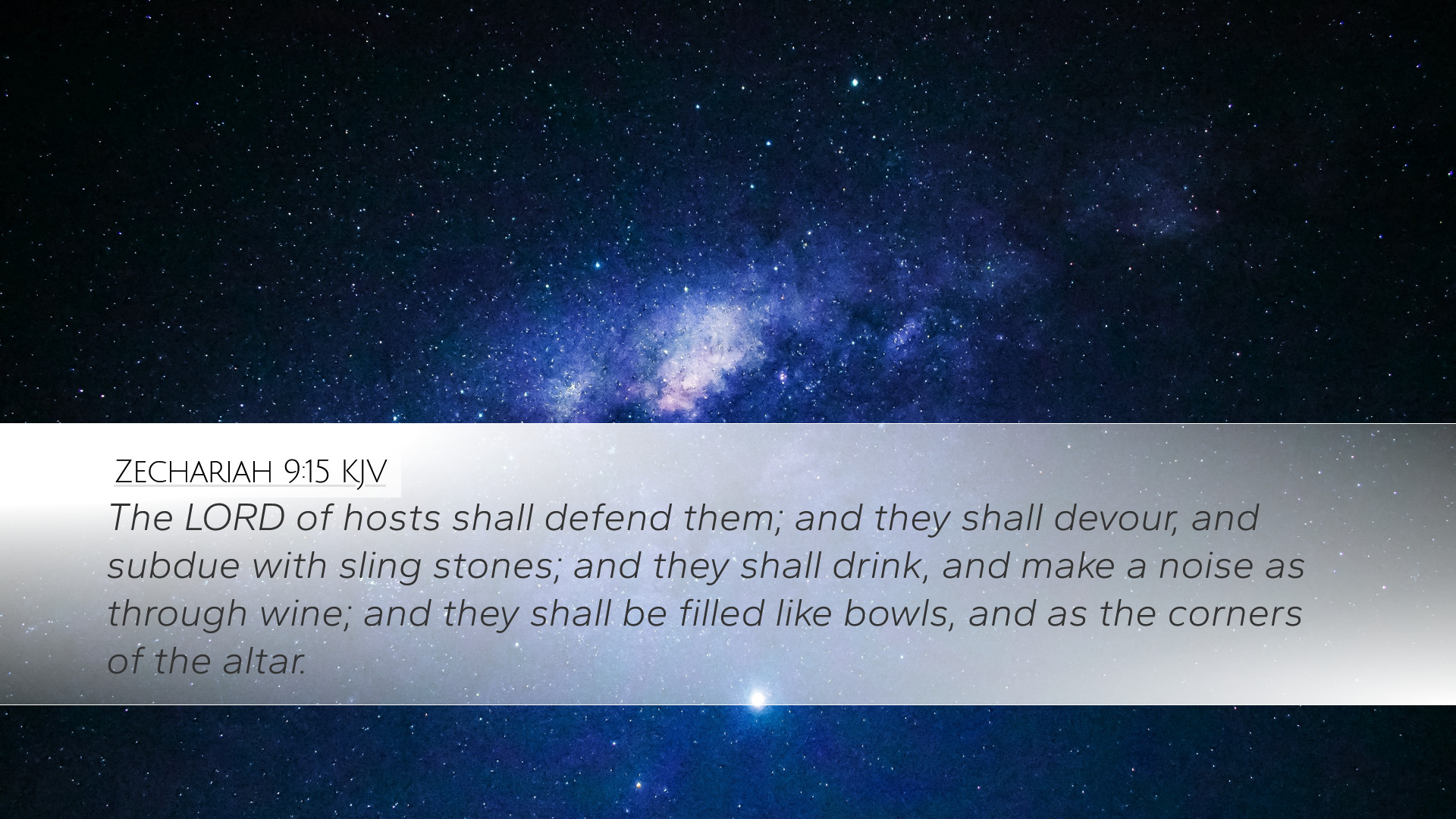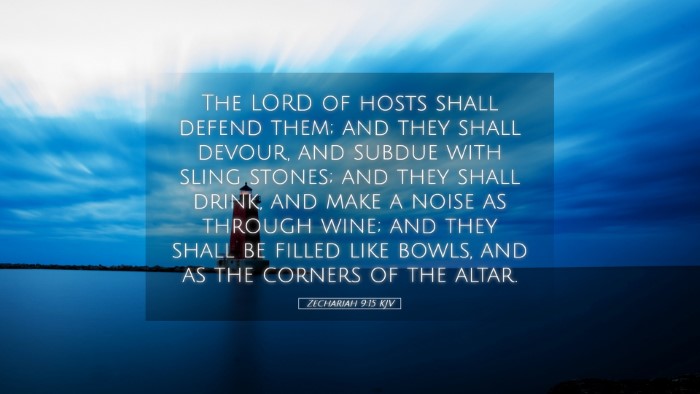Old Testament
Genesis Exodus Leviticus Numbers Deuteronomy Joshua Judges Ruth 1 Samuel 2 Samuel 1 Kings 2 Kings 1 Chronicles 2 Chronicles Ezra Nehemiah Esther Job Psalms Proverbs Ecclesiastes Song of Solomon Isaiah Jeremiah Lamentations Ezekiel Daniel Hosea Joel Amos Obadiah Jonah Micah Nahum Habakkuk Zephaniah Haggai Zechariah MalachiZechariah 9:15
Zechariah 9:15 KJV
The LORD of hosts shall defend them; and they shall devour, and subdue with sling stones; and they shall drink, and make a noise as through wine; and they shall be filled like bowls, and as the corners of the altar.
Zechariah 9:15 Bible Commentary
Commentary on Zechariah 9:15
Verse Text: "The LORD of hosts shall defend them; and they shall devour, and subdue with sling stones; and they shall drink, and make a noise as through wine; and they shall be filled like bowls, and as the corners of the altar." (Zechariah 9:15, KJV)
Introduction
The prophecy in Zechariah 9:15 reflects the tension between God's judgment and His promise of salvation. This verse encapsulates the fierce defense that God provides for His people during times of conflict and adversities. It emphasizes not just a divine act of protection but also the lavish blessings that come as a result of faithful deliverance.
Contextual Overview
In understanding Zechariah's message, one must consider the historical and theological context. The prophet is addressing a nation that is emerging from the Babylonian exile, grappling with restoration and the fulfillment of divine promises. Zechariah's role as a prophet includes exhortation towards a renewed faith among the remnant of Israel.
Thematic Analysis
- Divine Defense: The phrase "The LORD of hosts shall defend them" presents God as an active protector. Matthew Henry emphasizes that the "LORD of hosts," or the God of armies, fights for His people, ensuring their victory against enemies.
- Symbolism of Devouring: The use of "devour" and "subdue with sling stones" suggests a vigorous assertion of God’s sovereign power. Albert Barnes notes that this imagery portrays Israel's military prowess enabled by divine strength, signifying they shall overcome their foes.
- Joyful Abundance: The latter part of the verse, highlighting drinking and making noise as through wine, indicates a state of joy and abundance. Adam Clarke interprets this as a metaphor for spiritual refreshment and social celebration, portraying a picture of God’s people thriving post-deliverance.
- Comparison to Sacred Rituals: In mentioning "filled like bowls, and as the corners of the altar," the imagery conjures the fullness associated with sacred offerings. This evokes the covenant relationship between God and His people, illustrating that through divine intervention, they are restored not only physically but spiritually.
Exegetical Insights
Examining the Hebrew terms and syntactical structure offers further depth to the verse. The original language conveys a robust sense of divine agency and accomplishment. “Defend” translates to a form of vigorous guarding or rescue, amplifying God’s active role in assuring victory for Israel.
Theological Implications
This passage invites theologians to reflect on the nature of divine protection as both temporal and spiritual. God's defense can be seen as a foreshadowing of Christ’s ultimate victory over sin and death, inviting believers into a rich understanding of their own security and joy in Him.
Application for Today
For modern readers, particularly pastors and students of Scripture, this verse offers profound encouragement. It reminds believers of God’s relentless protection and the abundant spiritual life made available through faith. It calls for a response of worship and trust amidst life’s battles, acknowledging God as the source of strength and joy.
Conclusion
Zechariah 9:15 serves as a potent reminder of God's commitments to His people. Through divine defense and abundant provision, believers are called to rejoice in God's faithful promises. This passage not only encapsulates God's historical dealings with Israel but also serves as a timeless declaration of hope, encouragement, and a call to faithful living.


